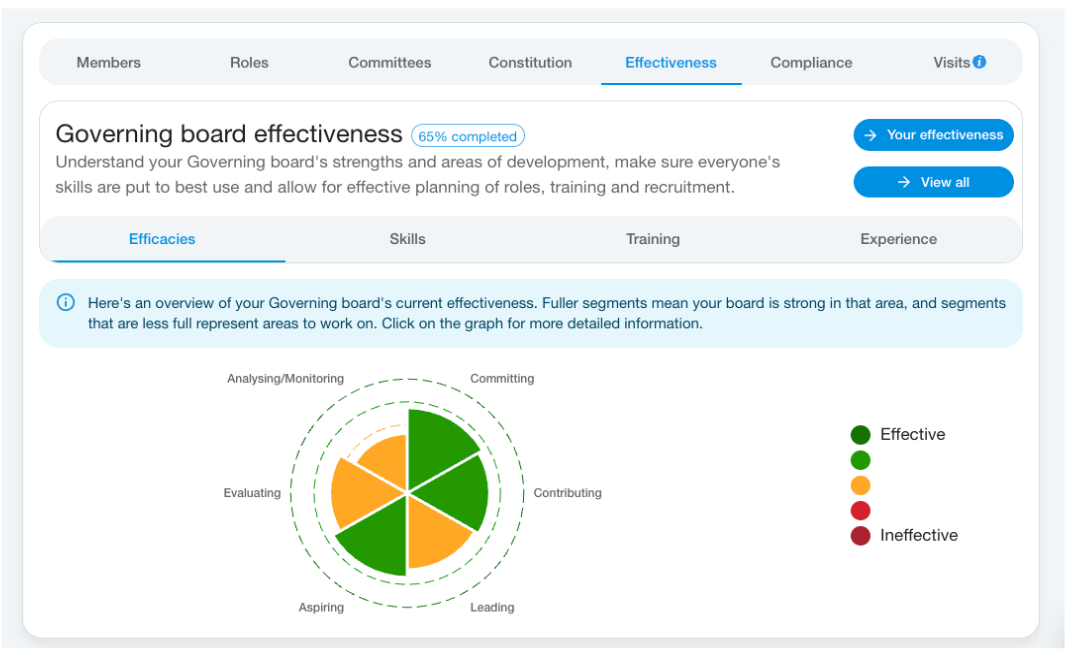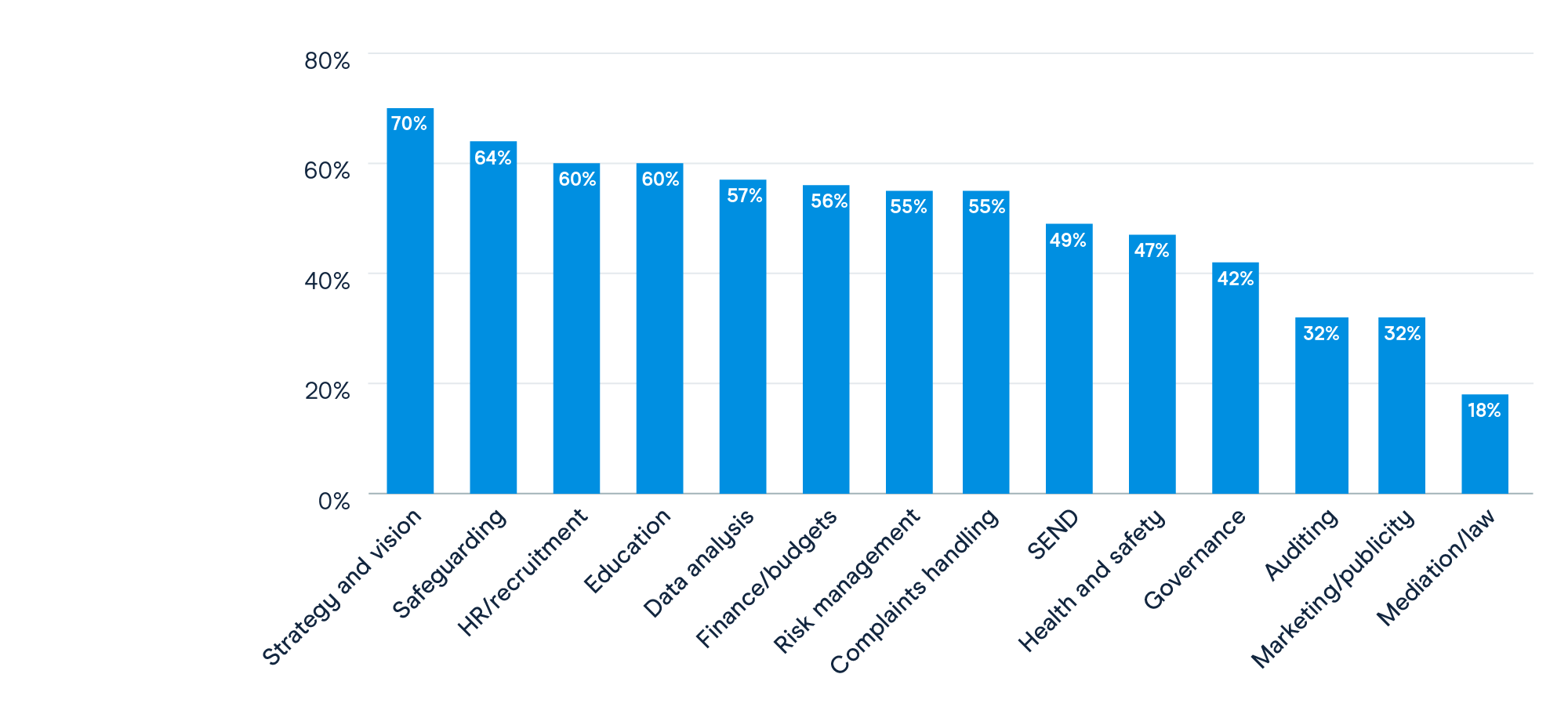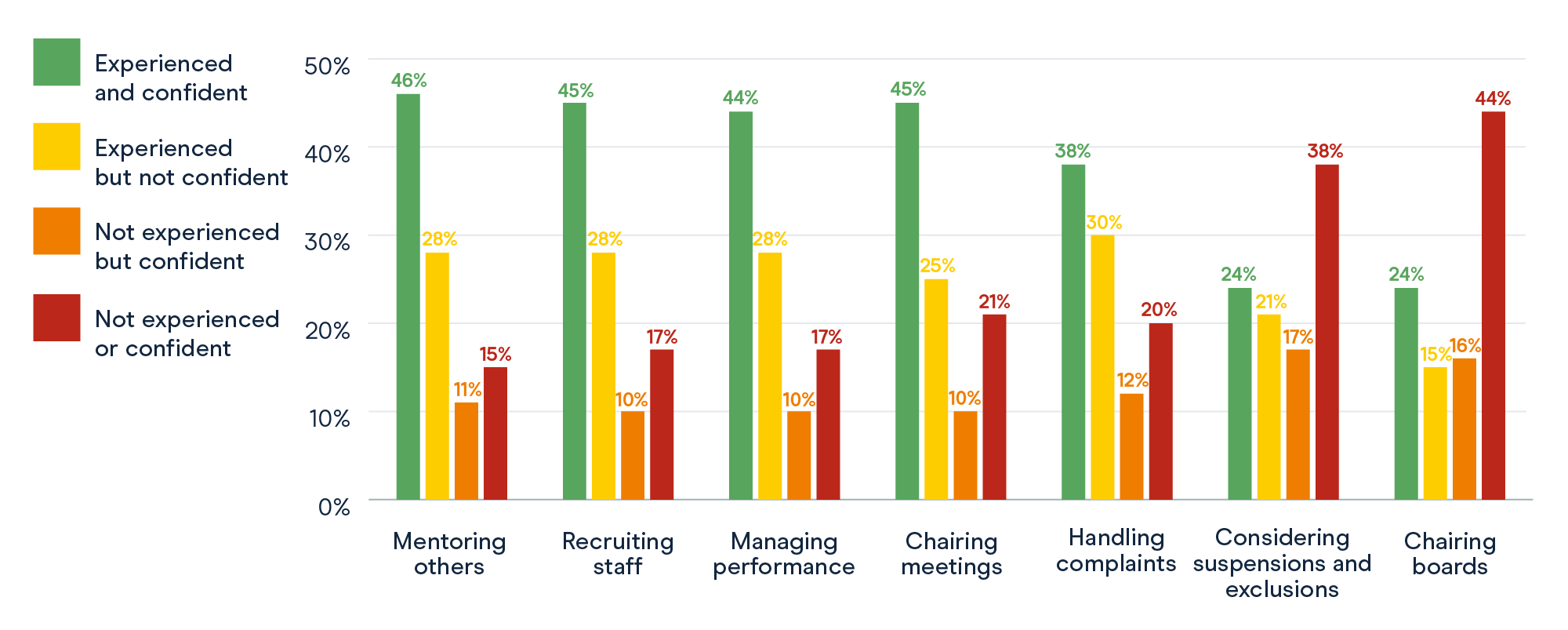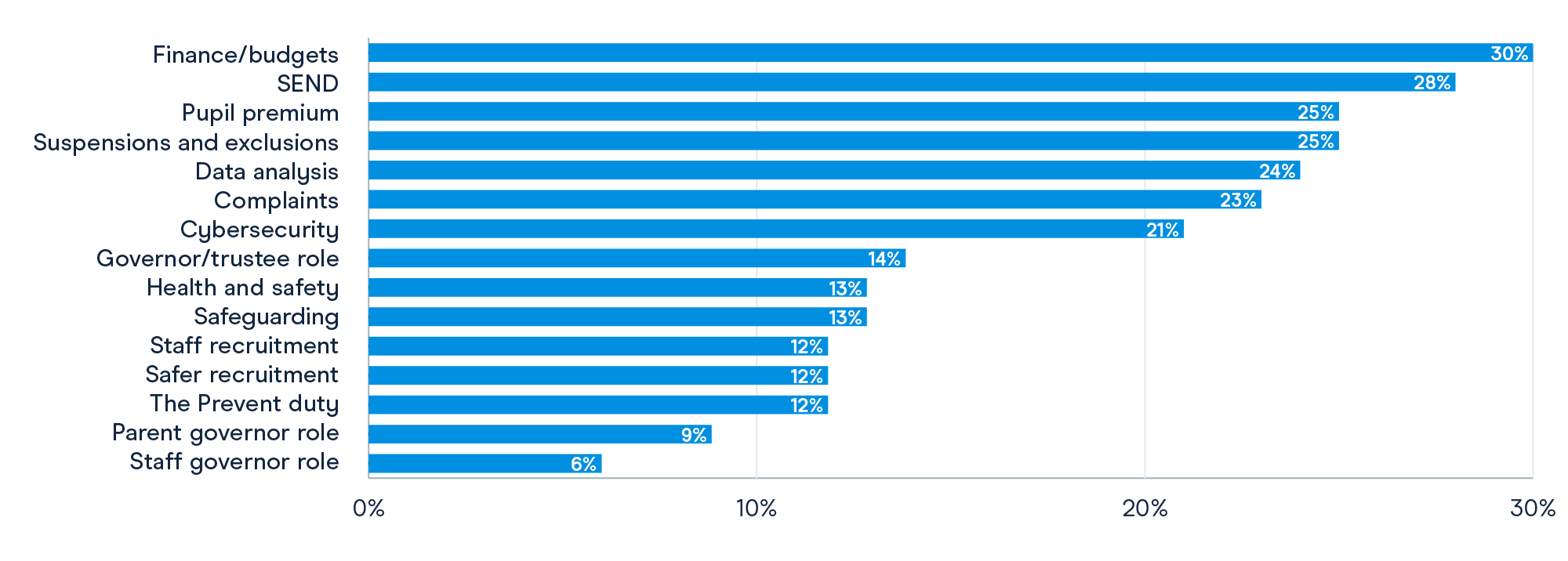How effective are our governing boards?
Governing boards up and down the country have long been auditing themselves in a bid to understand their strengths and weaknesses - whether for self improvement, or guidance on which gaps they need to fill when it comes to recruitment.
As a long-standing governor, the audit is something I’ve filled in several times, the result changing each time we do it, depending on the composition of the board. We have used the information it throws up to think about what is missing from our collective experience and undertake training, or adapt our ads for new governors, accordingly.
But I’ve always wondered - how do we compare to other boards? Is it “normal” to have so many people with financial and educational experience among us, or are other boards more replete with skills in HR, for example?
“Is it ‘normal’ to have so many people with financial and educational experience among us?”
The answer to this question, and others, is now available thanks to the national data collected by over 22,000 governors on nearly 5,000 boards across the country, all of whom have used the new “governing board effectiveness” tool that is now part of GovernorHub. As a tool that around two thirds of boards now have access to, I cannot wait to see this data set swell.
Interestingly, it has not been built as an “audit”, with connotations of something that is done at a point in time “for the record”, but as a tool that allows boards to continually drill into how effective they are at doing the “jobs” of governance - whether that’s contribution to discussion or analysing data. So, “effectiveness” rather than just “skills”. I’m sure anyone who has sat on a board has met, for example, a governor that comes with great finance skills but hasn’t yet translated that into contributing to discussion…or a brilliant COO who hasn’t yet found the balance of operational vs strategic. This is the tool to help.
As a dashboard, it looks like this:
GovernorHub board effectiveness tool: dashboard view
Zooming out to look at a national picture makes for interesting reading.
What are governors experienced in?
Base: 21,543 governors across England
The biggest area is “strategy”, with 70% of governors reporting that they have experience here. Of all the options, that probably aligns best with one of the 3 main roles of governance - setting and monitoring the strategic vision - so that’s no bad thing.
It might be more surprising to see “safeguarding” in second place, with 64% reporting experience in this area. Safeguarding expertise is something most people wouldn’t associate with “corporate” jobs, or even the “average” job, but is a big part of what the board monitors through their reports from the designated safeguarding leader. So again, a great sign of what is likely a lot of safeguarding training undertaken at least, or real-word experience at best.
In joint third place we have “education”, at 60% - arguably this will be a combination of those who have either taught themselves, or who currently come from the school’s staff body. It might also mean school staff from other schools, looking to get experience of a board to support their own leadership ambitions. So maybe not so surprising.
Those areas at the other end of the spectrum provide a helpful reminder of why diversification of boards is important at all levels. Only 18% had had any experience of mediation or law - with the huge rise in parental complaints being levelled at schools, it would arguably be helpful to recruit more governors with a legal understanding, if not lawyers themselves. Similarly, only 32% have marketing experience - with falling rolls, schools and their boards are increasingly having to think about how they “sell” themselves to prospective parents to fill classrooms and stem deficit budgets.
42% say they have “governance” experience - we can read that in two ways. One way would be to say that boards have done well to attract people new to governance - alongside all the potential diversity of thought that comes with that. Another way would be to say that governors are not necessarily sticking around once they have served their term (or possibly less than their term). Either way, giving them support to become experienced in “governance” is vital.
But overall, the graph describes a pretty well rounded set of experience nationally - and those organisations like Governors for Schools, who support recruitment, have done a fantastic job at covering the bases identified as board needs.
We asked Hannah Stolten, the CEO of Governors for Schools for her view on what the data shows. She told us “the breadth of skills shown via the effectiveness tool reflect the asks from schools when looking for new governors. ‘Safeguarding’ and ‘education’ are both in the top 5 skills requested by schools using our recruitment platform. However, our number one asked-for skill is ‘finance’. Not unexpected perhaps when schools are struggling to balance their budgets, but this has been consistent over many years now.
“Our number one asked-for skill from schools is ‘finance’”
“What is noticeable is that we are now starting to see a clear divergence in the skills requested by maintained schools as opposed to academy schools. While ‘finance’, ‘education’ and ‘safeguarding’ are in the top 5 for both types of school, ‘HR’ and ‘health and safety’ are prioritised for maintained schools, while ‘local community links’ and ‘SEND’ are prioritised for academy local governing boards. I think this reflects the increased awareness of what is needed for the differing governance structures - and that skills audits are being used to inform recruitment decisions.”
What are governors skilled in, and what are they confident in?
Base: 21,543 governors across England
The dark blue columns show experience levels, the light blue, confidence. In all but one measure (chairing boards), there is a gap between experience and confidence in favour of the former. This gets to the point at why a traditional “audit” only takes boards so far. The biggest percentage point gap is between the experience (73%) and confidence (54%) - a gap of 19 percentage points - in managing performance. A key part of a board’s role is managing the performance of the headteacher, and there’s lots to do to improve the confidence of governors here, for a task which is different to managing performance in say the private sector. Managing performance links directly to school improvement, among other things, and having a good read on where a headteacher is on their own performance journey is crucial.
“The biggest percentage point gap is between the experience and confidence of governors in managing headteacher performance”
Similarly, there are fairly big gaps in experience and confidence in recruiting staff (where the gap is 18 percentage points), handling complaints (18 percentage points), recruiting staff (18 percentage points) and mentoring others (17 percentage points). It is fantastic to see high levels of experience in all these categories, but we do need to support governors to feel confident in carrying out these types of jobs too. Training and mentoring in how to deploy these skills in a governance setting is key.
While the 40% who say they are both experienced and confident at chairing boards might seem low, this could be seen as a positive result. It’s unlikely that more than 40% of a board has a chairing role, so we should feel encouraged that perhaps more people than currently get to chair the board (or its committees) could be persuaded to do so in the future, at least when it comes to current confidence and experience levels. Of course, chairing a meeting in the workplace, and chairing, say, an exclusion panel, are very different - and to do the latter well requires governance-specific training for both those aspiring to a chairing role, but also for those currently in the seat.
Digging into the gaps
Base: 21,543 governors across England
It’s worth digging into this data however. We have also captured how governors feel about the overlap (or not) of experience and confidence.
Let’s start with the red bars, which indicate where people feel neither experienced or confident. 44% said they feel this way about chairing boards - not so big a problem if only a subset of governors are expected to do that.
But 38% also feel that way when it comes to considering suspensions and exclusions (and conversely, only 24% - the green bar - feel both experienced and confident at considering them). This is less of an issue (although rising) in primary schools, where suspensions and exclusions are much rarer, but it seems there’s more to do to help secondary school governors get to a place where they are ready to deal with what can be a life-changing event for a young person.
The orange bars - where governors say they are not experienced but confident - are also revealing. Governors’ confidence might come down to having completed some training, but not having experience dealing with the real-life scenario. Or it could come down to confidence from a non-governor role, such as the workplace, which hasn’t yet been required in their governor role. An interesting area is chairing boards - where 16% say they are not experienced but confident they could do it. That likely means at least one or two people on average, per board, are likely able, with training, mentoring and some encouragement, to step up to chairing. It’s a more positive way of framing the situation where the election of a new Chair is often met with reluctance - a reminder that there will likely be people who are persuadable, with support.
“At least one or two people on average, per board, are likely able, with training, mentoring and some encouragement, to step up to chairing”
The yellow bars show those who despite experience are still not confident. 30% of governors felt this way about handling complaints - possibly because this puts them in the realm of both legal challenges, but also among stakeholders (usually parents, but also staff) with a reason for feeling angry or upset. Perhaps these governors have been burnt previously (they are “experienced”), or maybe this is just an area which is hard to ever feel confident in, with complaints being different each time. With complaints becoming more commonplace, and made easier with the use of generative AI, this is something for boards to keep an eye on.
What do boards need training on?
Base: 21,543 governors across England
This is an interesting graph for me. Very few governors (whether they are staff governors, parent governors or co-opted for their skills) reported needing training on the role itself. It’s fair to say that these governors will all have had training on their role via their membership of GovernorHub - so it’s great to see that this is likely to have had a big, positive impact on their understanding of what they need to “do”.
On the other hand, the top of the graph shows what is really the tough end of being a governor - with the top 4 areas being linked to budgeting and inclusion. 30% would like training on finance and budgets - which look very different from the kinds of budgets governors might be used to dealing with in their day jobs, not least because they involve public money, lots of which is ringfenced for particular activities.
Likewise, 28% are looking for training on SEND - this might of course include the budgeting side of SEND, linked to the previous point around finance. But SEND is a massive topic for schools to grapple with - from resourcing staff, to admissions, to behaviour, to impact of provision, to inclusive policies and the now huge focus from Ofsted. It’s clear that governors continue to need support here - and arguably this will ramp up once the schools white paper, which will include SEND reforms, gets published in 2026.
The third area is around pupil premium (25%) - again, likely to include the budget implications as well as the provision itself, and monitoring the impact of that. And the fourth area listed is suspensions and exclusions, with 25% needing training here. With so many suspensions and exclusions relating to pupils with SEND, it’s not surprising that this is also a priority training area.
Putting it all together
Ultimately, what really matters here is not the national picture, but the picture on an individual board: is the group of people around the table effective? Do they understand the vision? Are they able to have difficult conversations? Do they know what ‘good’ looks like? We have an enormous amount of data here - currently over 2,000 boards have collected data from at least 5 governors/trustees, and this tool is only recently launched. What we can see, is that there are huge differences in how governors are assessing themselves, with for example an average score of 4.52 / 5 against the option “I feel safe to voice opinions” at the top end, and at the bottom, an average score of 3.69 / 5 against “I know the strengths of my board”.
This matters - surfacing what people really think about their own effectiveness is the start of the collective journey undertaken by the whole board, on the way to truly great governance. This is a tool that above all, is getting boards thinking and talking about effectiveness - and how they might evidence the outcome.
We look forward to charting that journey as the data rolls in.





